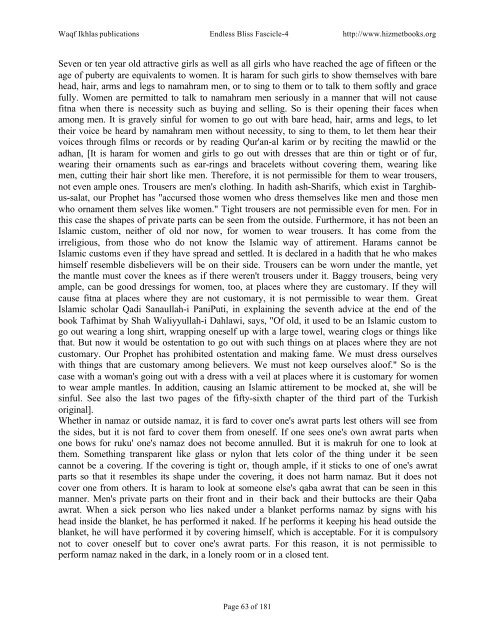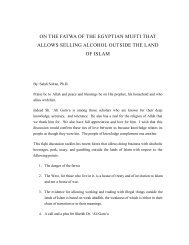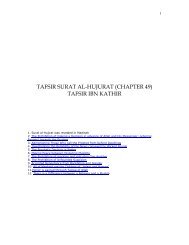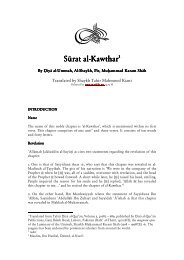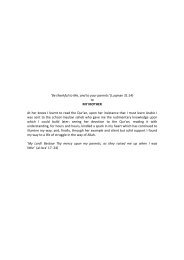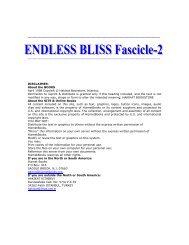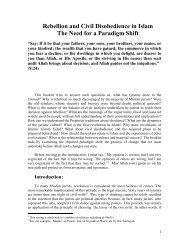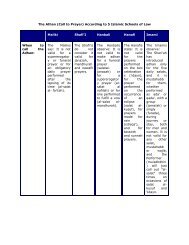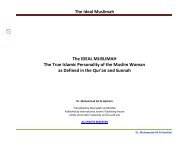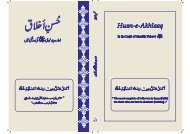ENDLESS BLISS FASCICLE-4
ENDLESS BLISS FASCICLE-4
ENDLESS BLISS FASCICLE-4
Create successful ePaper yourself
Turn your PDF publications into a flip-book with our unique Google optimized e-Paper software.
Waqf Ikhlas publications Endless Bliss Fascicle-4 http://www.hizmetbooks.org<br />
Seven or ten year old attractive girls as well as all girls who have reached the age of fifteen or the<br />
age of puberty are equivalents to women. It is haram for such girls to show themselves with bare<br />
head, hair, arms and legs to namahram men, or to sing to them or to talk to them softly and grace<br />
fully. Women are permitted to talk to namahram men seriously in a manner that will not cause<br />
fitna when there is necessity such as buying and selling. So is their opening their faces when<br />
among men. It is gravely sinful for women to go out with bare head, hair, arms and legs, to let<br />
their voice be heard by namahram men without necessity, to sing to them, to let them hear their<br />
voices through films or records or by reading Qur'an-al karim or by reciting the mawlid or the<br />
adhan, [It is haram for women and girls to go out with dresses that are thin or tight or of fur,<br />
wearing their ornaments such as ear-rings and bracelets without covering them, wearing like<br />
men, cutting their hair short like men. Therefore, it is not permissible for them to wear trousers,<br />
not even ample ones. Trousers are men's clothing. In hadith ash-Sharifs, which exist in Targhibus-salat,<br />
our Prophet has "accursed those women who dress themselves like men and those men<br />
who ornament them selves like women." Tight trousers are not permissible even for men. For in<br />
this case the shapes of private parts can be seen from the outside. Furthermore, it has not been an<br />
Islamic custom, neither of old nor now, for women to wear trousers. It has come from the<br />
irreligious, from those who do not know the Islamic way of attirement. Harams cannot be<br />
Islamic customs even if they have spread and settled. It is declared in a hadith that he who makes<br />
himself resemble disbelievers will be on their side. Trousers can be worn under the mantle, yet<br />
the mantle must cover the knees as if there weren't trousers under it. Baggy trousers, being very<br />
ample, can be good dressings for women, too, at places where they are customary. If they will<br />
cause fitna at places where they are not customary, it is not permissible to wear them. Great<br />
Islamic scholar Qadi Sanaullah-i PaniPuti, in explaining the seventh advice at the end of the<br />
book Tafhimat by Shah Waliyyullah-i Dahlawi, says, "Of old, it used to be an Islamic custom to<br />
go out wearing a long shirt, wrapping oneself up with a large towel, wearing clogs or things like<br />
that. But now it would be ostentation to go out with such things on at places where they are not<br />
customary. Our Prophet has prohibited ostentation and making fame. We must dress ourselves<br />
with things that are customary among believers. We must not keep ourselves aloof." So is the<br />
case with a woman's going out with a dress with a veil at places where it is customary for women<br />
to wear ample mantles. In addition, causing an Islamic attirement to be mocked at, she will be<br />
sinful. See also the last two pages of the fifty-sixth chapter of the third part of the Turkish<br />
original].<br />
Whether in namaz or outside namaz, it is fard to cover one's awrat parts lest others will see from<br />
the sides, but it is not fard to cover them from oneself. If one sees one's own awrat parts when<br />
one bows for ruku' one's namaz does not become annulled. But it is makruh for one to look at<br />
them. Something transparent like glass or nylon that lets color of the thing under it be seen<br />
cannot be a covering. If the covering is tight or, though ample, if it sticks to one of one's awrat<br />
parts so that it resembles its shape under the covering, it does not harm namaz. But it does not<br />
cover one from others. It is haram to look at someone else's qaba awrat that can be seen in this<br />
manner. Men's private parts on their front and in their back and their buttocks are their Qaba<br />
awrat. When a sick person who lies naked under a blanket performs namaz by signs with his<br />
head inside the blanket, he has performed it naked. If he performs it keeping his head outside the<br />
blanket, he will have performed it by covering himself, which is acceptable. For it is compulsory<br />
not to cover oneself but to cover one's awrat parts. For this reason, it is not permissible to<br />
perform namaz naked in the dark, in a lonely room or in a closed tent.<br />
Page 63 of 181


